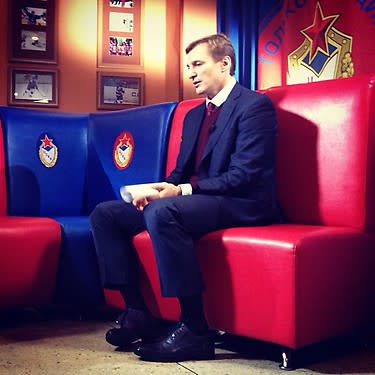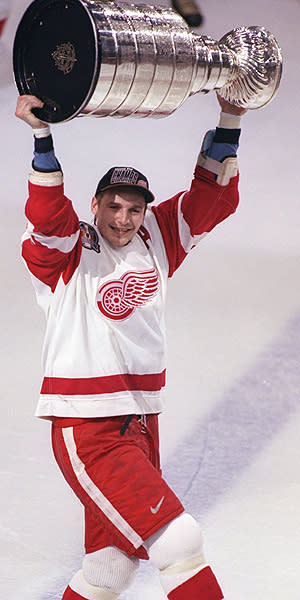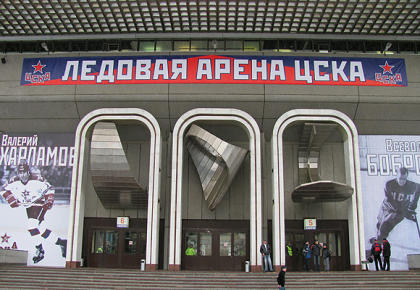The evolution of Sergei Fedorov: From Soviet defector to NHL superstar to Russian rebuilder
MOSCOW – He defected. Remember that. Remember that as Sergei Fedorov does a TV interview surrounded by CSKA Moscow memorabilia – red stars on the sofa, a red star on the banner looming behind him. Remember that as he sits in his office at the Soviet arena on Leningradsky Prospect, the new head manager of what once was literally the Central Sport Club of the Army.

This is a story about evolution. The country has changed. Fedorov has changed. Look at them now: Moscow's streets are choked with the fancy cars Fedorov once left to drive in America, and Fedorov has returned to the club he abandoned to build a modern professional hockey organization upon that Central Red Army foundation – with guidance from none other than Viktor Tikhonov, the legendary Soviet taskmaster.
"It's very exciting, because my former head coach is still here," says Fedorov, who first joined Tikhonov and CSKA when he was only 15. "If he walks in right now, don't be surprised. We always have that connection. He always comes in, or I always come to his office."
Fedorov smiles. He says his mentor's full name in that formal, respectful Russian way. "Viktor Vasilyevich Tikhonov." Now 82, Tikhonov is the "honorable president of the club." After a game the other night, he quietly walked down the hall outside the dressing room, right past a floor-to-ceiling, black-and-white photo of himself.
"He's very involved," Fedorov says.
In the 46 years of the Soviet League, Central Red Army won the regular-season title 32 times, including 13 straight times under Tikhonov from 1977-89. It was runner-up 10 times. It featured members of the national team, also coached by Tikhonov. It was the club of legends – Vsevelod Bobrov, Valeri Kharlamov, Vladislav Tretiak … too many to mention.
[Nick Cotsonika: Pavel Datsyuk's magic act astonishes fans, teammates in KHL]
But then players like Fedorov bolted, and the Soviet Union collapsed. Things are different now. CSKA can no longer hand-pick the best players of the Soviet empire, kind of like the Montreal Canadiens can no longer lay special claim to Quebec players. Most of the best Russians play in the NHL, unless there's a lockout. So Fedorov has to uphold all that tradition without any advantages in the Kontinental Hockey League, kind of like the Habs have to in today's NHL. CSKA has finished no better than 13th in the KHL each of the past three seasons.
It is a daunting challenge, and it is even more daunting when you consider Fedorov is responsible for CSKA's junior team and youth hockey school, too. But Fedorov doesn't seem frazzled as people pound on his locked office door, and one cell phone rings, and a second cell phone rings, and the desk phone rings, and he says he wishes he could have "48 hours a day." He seems older and wiser at age 42. He doesn't know if he will succeed. Yet he seems happy, enthusiastic and ambitious.
This is still the same guy who had the guts to leap into the unknown with nothing to his name as a 20-year-old kid. Remember that.
"Trying to make one step at a time," Fedorov says, "with a big thought behind it."
* * * * *
It was spy novel stuff. In 1990, still before the fall of the Iron Curtain, the Soviets came to play in the United States. The Detroit Red Wings, who had drafted Fedorov in the fourth round the year before, hatched a plan to sneak him out of the team hotel, a Holiday Inn on the outskirts of Portland, Ore.

The Wings hired a Russian-speaking journalist to communicate with Fedorov during media availability. The operation was a go. On his way to a game, Fedorov discreetly dropped his room key in the lobby. The journalist picked it up, went to Fedorov's room and gathered his belongings – what there were of them, anyway.
"He had a little bag with hardly anything in it," says Nick Polano, the Wings' assistant general manager at the time and now an Ottawa Senators scout.
On his way back from the game, Fedorov was the last one off the bus, as he was supposed to be. He saw a man reading a newspaper – Jim Lites, now the president of the Dallas Stars – and recognized the signal. He followed Lites out a back door, where Polano was waiting in a limousine. They drove to the airport and dashed into Wings owner Mike Ilitch's private jet.
"We were back in Detroit before they even knew he was gone," Polano says.
That story is well told. But this one, not so much: In 1991, still before the fall of the Iron Curtain, the Soviets came to play in Canada – and Fedorov rejoined them. He played five games for the USSR in the Canada Cup, with two goals and four points in five games.
Fedorov was proud to play for Tikhonov. He just didn't want to spend 11 months a year barracked in training camp when he could play in the NHL, make big money and live a North American lifestyle. Tikhonov took him back for that tournament.
"I felt as a Russian young player that I still part of the Soviet Union very much, and I'm still part of the school that Viktor Vasilyevich taught me," Fedorov says. "I came back, and I felt there might be some repercussions, but none of them happened. Everything went down to business, and I played. …
"At that time for me, we kind of bury the hatchet a little bit. I show him I'm a good guy, good player – just could not live on a hockey base all my life. There was a second sort of part to hockey player life, and that was maybe play somewhere else."
[Slideshow: #NickInEurope photo diary from Moscow and Prague]
Fedorov played once more for Tikhonov after the fall of the Iron Curtain, when Russian stars toured their home country in the mid-1990s. He played several more times for Russia in international tournaments.
He read something recently he had never heard before: Tikhonov told an interviewer that he forgave Fedorov because he was so young when he defected. Had Fedorov been older, it might have been different.
"I know how deeply involved he was with the players that he trained, and now I understand how much he spend as a coach – energy, emotions, like, anything – to make us to play the best hockey, to bring Russia all those titles," Fedorov says. "And I'm telling you, this is hard level to match. For me, so far, not possible, at all. I understand circumstances were whatever Viktor Vasilyevich wants, but what he did on the ice, it was just very hard, incredible magic."
* * * * *
Fedorov sits in a cafe in the concourse of the CSKA Ice Palace, giving a TV interview to former NHLer Alexei Zhitnik for Ukrainian television. If you don't speak Russian, it's hard to understand. But if you follow the Red Wings, you can pick out some things: "Jim Devellano." "Scotty Bowman." "Slava Fetisov." "Igor Larionov." "Russian Five."

Later, Fedorov returns to his office. He doesn't have many mementos on display, but he does have a framed picture of him and his family with Wings owners Mike and Marian Ilitch, taken the night he won the Hart Trophy as the NHL's most valuable player and the Selke Trophy as the league's best defensive forward in 1994.
Detroit is like Fedorov's other Russia. He remained loyal and returned, even though he once chose to leave. He appreciates it more with age.
Though he signed as a free agent with the Mighty Ducks of Anaheim in 2003 and went on to play for the Columbus Blue Jackets, the Washington Capitals and the KHL's Metallurg Magnitogorsk, he kept a place in Detroit. He still has a townhouse there. His parents still live there. He spent a month there this summer.
"Certainly Detroit is a huge era for me," says Fedorov, who won three Stanley Cups with the Wings. "I'm talking about even from Day 1, we were a good team. We progress and gain experience and gain good players, good coaches. Eventually we won. Those days are unbelievable. As I grow older, as I gain more experience, I'm ecstatic sometimes. Sometimes I get chills."
[Nick Cotsonika: Alex Ovechkin's star power trumps KHL]
The goal is for CSKA to grow in Moscow as the Red Wings did in Detroit, but make no mistake, this is Day 1 for Fedorov as an executive. This was not the plan.
The plan was to take the season off to deal with a troublesome lower back. He still hasn't announced his retirement as a player, and he still skates twice a week, leaving the door open. But a friend who ranks high in the Russian government urged him to think about his next chapter, so he interviewed with Russian Oil, the company that bought CSKA last year. He was thinking he'd be a hockey consultant.
"Then I realize, if I'm consultant, it's big-time pressure, too, so might as well do it yourself so you will be responsible," Fedorov says. "Why be responsible halfway or quarter of the way when you can be just responsible? So that's Russian thinking."
Fedorov has dived in, negotiating contracts, modernizing training, obsessing details – figuring it out and putting it together.
"I'm not a genius at everything, but I understand one thing: If I don't know something, I will go and ask until I get a proper answer, a proper idea," Fedorov says. "To me, most important and biggest challenge is to organize people.
"Sometimes I'm getting through, but sometimes I'm not getting through – and I know that. But I step back, and then make another step next day. So it's constant 24-hour sort of exchange of information of the views on certain ideas.
"It's getting everybody on the same page. I have one experience, the other person have another experience. I need to understand all of those experiences and bring them to the conclusion."
* * * * *
Walk up to CSKA Ice Palace, and you are struck by history. You see the Bobrov plaque, the Bobrov and Kharlamov banners framing the front door. Walk inside, and you are struck even more. From the concourse to the cafe to the dressing room to the Red Machine sports bar in the basement, there are artifacts everywhere.

You are also struck by reality. The arena is old and spartan and small. The seats aren't filled, even though there are only 5,600 of them, the prices are cheap and stars like Alex Radulov, Pavel Datsyuk and Mikhail Grabovski are in the lineup. The marketing department consists of one merchandise stand not selling much.
Fedorov wants even more memorabilia on display and promises it will be in place next season. He wants better marketing and merchandising. He says there is a new arena being planned – a multifunctional 18,000-to-20,000 seater like the Prudential Center in New Jersey, or Staples Center in Los Angeles, or HP Pavilion in San Jose.
"We're going to build something incredible," Fedorov says. "Right now we're working on it. I don't want to say too much, but we will have an arena, and it's going to be in a nice [public transportation] network where people can come and enjoy like North America. … As long as I work here, I want to fight for those fans and especially the families that come to the hockey game and enjoy it for the right price."
[Also: Which NHL owners are driving the NHL lockout?]
Can you imagine if the kid who left for North America helps bring North America to the kids? For that big thought to become reality, there need to be a lot of steps. Russia needs to keep changing. Fedorov needs to keep changing. CSKA needs to win.
"I have to do well for ownership, then we'll see," Fedorov says. "After every season, I will be on the docket – yes or no – and I understand that. … I understand the game and the rules of the game. To me, it's no problem. Actually, I think about those kind of things on a positive way. It makes you work twice as hard – and smart."
He smiles.
"Hopefully smart, too."
Isn't that what he has learned from Viktor Vasilyevich? Isn't that what it takes to make very hard, incredible magic?

 Yahoo Sports
Yahoo Sports 